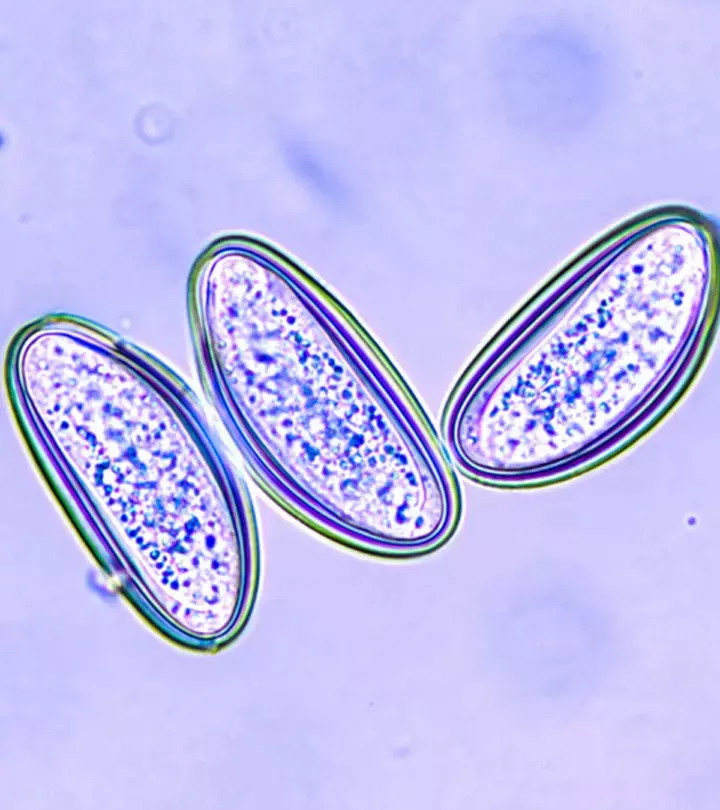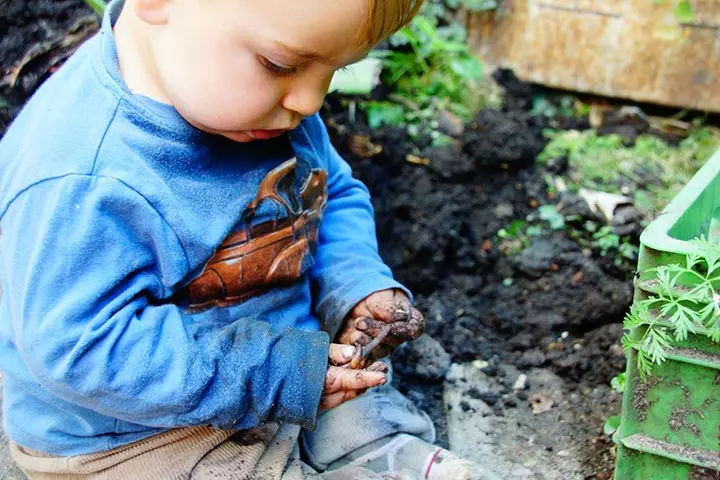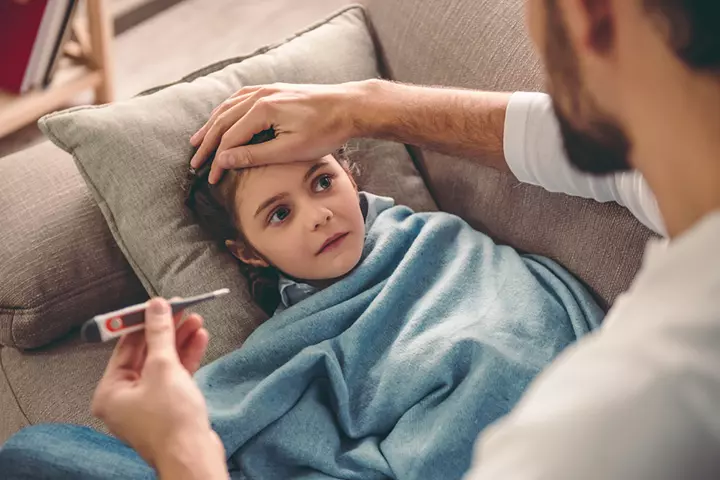
Image: Shutterstock
Worm infestation is a common health risk seen in children as well as adults. Worms are parasitic creatures that infest the intestinal region and feed off the host’s body. Contaminated food and water are common sources of worms (1). Also, direct contact with the soil or grass where children play can transmit worms to them through pores in the skin (2). These worms can rob the body of its nutrition, causing ailments like stomach aches, loss of appetite, weight loss, loose motions, and many others (3).

Once you detect any symptoms of worm infestations in your child, you shouldn’t delay getting them dewormed because worms are resilient creatures that don’t leave the body easily without proper medical intervention. So the earlier you start the deworming medications, the better it is. With this in mind, let’s dive in and learn more about worm infestations and how to tackle these parasites:
Types Of Worms And Their Symptoms

Image: IStock
There can be a variety of worms that can infest the human body. Some common ones among them are tapeworms, hookworms, pinworms, and roundworms. It’s also common to see infestations of multiple types of worms in the same body. Following are the distinct symptoms for each of them:
- Tapeworm: Loss of appetite, nausea, diarrhea, weight loss, and general weakness (4).
- Hookworms: Itching, tiredness, and rashes (5 ).
- Pinworms: Skin irritation, worms in the anus, and restless sleep (6).
- Roundworms: Abdominal pain, diarrhea, and fever (7).
How Worms Affect The Health And Well-being Of Children

Image: Shutterstock
Worms are parasites that cause many health issues for all, but children are more vulnerable to contract and suffer from them. Listed below are some of the ways worms cause trouble to the human body:
- Worms usually infest the intestines. This greatly affects the ability of the intestine to pass food in an efficient way. In severe cases, worm infestations can lead to intestinal blockage which would require immediate medical intervention.
- Worms can cause infections in the inner linings of the gut and intestines. A common symptom of this situation is itching in the rectum area. But in worse cases, the infection can be severe, leading to diarrhea accompanied by blood and mucus.
- Worm infestation can result in blood loss leading to severe iron deficiency. Children with worms often have to suffer anemia because of blood loss.
- The presence of worms often triggers allergic reactions in children. Doctors are often misled in finding the cause of the allergic reaction when the main culprit is the worm infestation.
- The worst of the lot are the tapeworms that can travel to different parts of the body if not checked in time. Tapeworms are known to even reach the brain and infest heavily. The host might have to face seizures and fits in such a case. In worst cases, the worms will have to be removed surgically since medicines would not be able to reach their places of infesting.
How To Administer Deworming

Image: IStock
Deworming is done through anti-parasitic medications. Your doctor would be able to determine the presence of worms through standard examinations. They would prescribe the right medicine and dosage depending on the age and condition of the child. Once the medication starts taking effect, the worms would be expelled via stool.
However, it has become a practice to administer worm medication to children yearly with or without symptoms in recent times. WHO also recommends preventative doses of these medicines for young children from 12 months to 14 years, once or twice a year. This helps in preventing any recurrence of worms at a later date. WHO recommendations suggest using albendazole (400 mg) and mebendazole (500 mg) for treating worm infestations in children. Both of these medicines are inexpensive, readily available, and easy to administer.
Positives Of Deworming

Image: Shutterstock
The presence of worms can have adverse effects on the health of children. Though not fatal in the early stages, they can attract other infections and diseases hampering the health and growth of the child. Chronic illnesses can easily find their way into a weak and disease-prone body.
Deworming is an efficient and easy way to tackle this problem. The immunity of the body will start improving within weeks of administering deworming medications. With the worms gone, the nutritional intake will automatically improve. The body goes back to being capable of absorbing vitamin A and other important nutrients.
You will start noticing observable improvements in your child’s productivity, concentration, and attention span. A healthy body helps form a happy demeanor. Your child will transition from being tired and fatigued to be more energetic and enthusiastic.
Precautions For Keeping Children Worm Free

Image: Shutterstock
Children are prone to contract worms while playing outside or eating and drinking from contaminated sources. Hygiene also plays a vital role in keeping children safe from worm infestations. Take the following precautions to keep your child free of worms:
- Ensure that your child has a proper wash with soap and water after playtime.
- Put the soiled clothes to wash as soon as your child returns from playtime.
- Avoid playing on soil or grass barefoot; put on shoes preferably.
- Make your child carry a water bottle and avoid drinking from outside sources.
- Make it a practice to boil the water before consumption.
- Properly wash fruits and vegetables before eating.
- Avoid outside food, especially food from street vendors.
- Use swimming facilities only if they ensure hygiene and cleanliness.
- Ensure yearly, or bi-annual deworm medication in consultation with the doctor.
- For households with pets, ensure deworming of the pets as well.
As seen from above, the presence of worms can be detrimental to the health and growth of your child. Worm infestations also attract a myriad of other diseases to the infected body. However, there are simple and effective ways of getting rid of worms. Consult the doctor early on and make sure your child doesn’t have to suffer the effects of a worm infestation. In addition to medical treatment, good eating habits and hygiene will go a long way in preventing contracting worms. Have you experienced worm-related problems in your family? Share your experiences with our readers in the comments section below.
References
- Water Treatment Cuts Parasitic Roundworm Infections Affecting 800 Million People
https://www.sciencedaily.com/releases/2019/08/190802144422.htm - Soil-transmitted Helminth Infections
https://www.who.int/news-room/fact-sheets/detail/soil-transmitted-helminth-infections - A Review And Meta-analysis Of The Impact Of Intestinal Worms On Child Growth And Nutrition
https://onlinelibrary.wiley.com/doi/10.1111/j.1740-8709.2007.00127.x - Human Taeniasis
https://www.cdc.gov/parasites/taeniasis/disease.html - Hookworm FAQs
https://www.cdc.gov/parasites/hookworm/gen_info/faqs.html - Pinworm Infection FAQs
https://www.cdc.gov/parasites/pinworm/gen_info/faqs.html - Parasites – Ascariasis
https://www.cdc.gov/parasites/ascariasis/
Community Experiences
Join the conversation and become a part of our nurturing community! Share your stories, experiences, and insights to connect with fellow parents.
Read full bio of Tikendrajit Pegu













